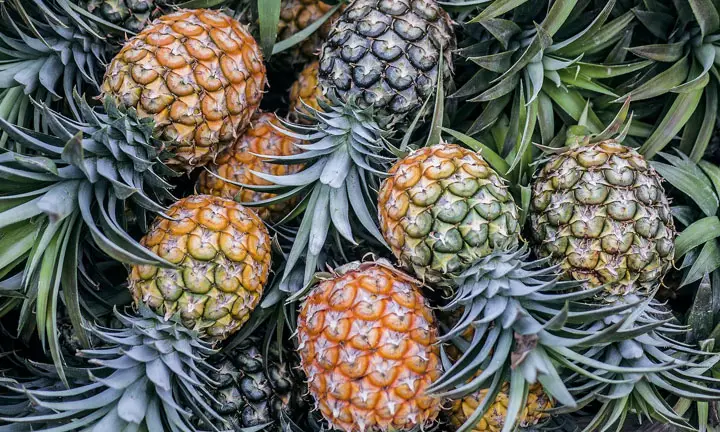Tropical fruits grow best in the warm and moist areas around the equator. These areas usually have lots of rain, hot weather, and soil that’s good for growing crops. Tropical fruits are easy to spot because they’re bright and colorful, taste really good, and are full of things that are good for your body.
Table of Contents
- What Makes Tropical Fruits Special
- So, Is the Strawberry a Tropical Fruit?
- Where Do Strawberries Come From?
- What Kind of Weather Do Strawberries Need?
- Strawberries Are Full of Good Stuff
- How Strawberries Keep You Healthy
- Cooking with Strawberries
- Picking and Keeping Strawberries Fresh
- Some Fun Strawberry Facts
- Final Thoughts
- FAQs
What Makes Tropical Fruits Special
Tropical fruits have some unique features. They’re often juicy and soft. You’ll find that their tastes can be sweet and sour or even a mix that reminds you of the tropics. Plus, they have lots of vitamins and minerals inside them, which are great for keeping you healthy.
So, Is the Strawberry a Tropical Fruit?
No, strawberries don’t fit into the tropical fruit category. While they can be grown in different places, they usually like cooler climates known as temperate zones. They can be found in areas that are between being really cool and slightly tropical.
Where Do Strawberries Come From?
Strawberries have been around for a really long time. People think they first grew in Europe and North America. They’ve been farmed for hundreds of years and now they’re grown in lots of countries all over the world.
People love strawberries because they taste great, smell lovely, and you can use them to make lots of different foods.
What Kind of Weather Do Strawberries Need?
Strawberries like cooler places and don’t need the really hot weather that tropical fruits enjoy. They grow well when they get the right amount of sun and not too much heat. Mild winters and warm, but not too hot, summers are perfect for strawberries.
Strawberries Are Full of Good Stuff
Strawberries are so tasty and healthy! They don’t have many calories and they’re full of Vitamin C and K, fibers that help your stomach, and stuff called antioxidants that can stop your cells from getting damaged.
How Strawberries Keep You Healthy
Because strawberries have lots of antioxidants, they can protect your body from harm and help stop swelling. Eating strawberries might help your heart, make your stomach happy, and keep your skin looking good. They also have lots of fiber which helps your stomach work properly and keeps your blood sugar at a good level.
Cooking with Strawberries
There are so many ways to use strawberries in the kitchen. You can eat them on their own, add them to salads, make smoothies, or bake them into cakes and pies. They’re also great for making jams and sauces that taste amazing.
Picking and Keeping Strawberries Fresh
When choosing strawberries, find ones that are really red, have a nice shape, and feel firm. Stay away from those that are squished, have mold, or aren’t fully red. At home, keep them in your fridge and only wash them just before you eat them, so they stay fresh longer.
Some Fun Strawberry Facts
- The strawberry isn’t actually a single berry. It’s made up of lots of tiny parts from one flower.
- A usual strawberry has about 200 tiny seeds on the outside.
- More strawberries come from the United States than any other country, with Mexico and Spain also growing a lot of them.
Final Thoughts
Strawberries aren’t tropical fruits, but they’re still really special. They grow in places with mild weather and need the right mix of sun and cool air. They’re famous for their sweetness and full of good things that help our bodies.
Whether you enjoy strawberries fresh, put them in your food, or bake with them, these fruits are absolutely wonderful. Next time you eat a strawberry, think about how amazing it is that we get to enjoy such delicious food from nature.


![What Fruits Can Gerbils Eat? [10 Nutritious Fruits]](https://fruitonix.com/wp-content/uploads/2023/05/Screenshot-2023-05-13-12.04.13-AM.png)






